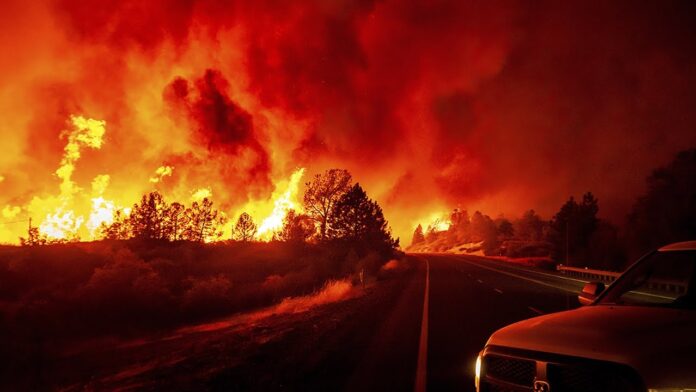Park fire, fueled by extreme weather and arson, forces evacuations and threatens Lassen Volcanic National Park
The Park Fire in northern California has rapidly ascended to become the state’s seventh-largest wildfire on record, burning through vast swathes of land in less than a week. The blaze, which began on July 24 and is believed to have been started by arson, has scorched approximately 360,141 acres and is currently only 12% contained.
Fire Details and Impact The Park Fire has consumed up to 150,000 acres per day, driven by intense heat and dry conditions. It has prompted the closure of Lassen Volcanic National Park and led to the evacuation of thousands from Butte, Plumas, Shasta, and Tehama counties. The fire has also destroyed numerous structures, although the full extent of the damage is still being assessed.
Current Conditions According to Mark Brunton, operations section chief at the California Department of Forestry and Fire Protection, fire activity increased significantly over the weekend. The blaze is encountering forests that have not burned for decades, contributing to its rapid expansion. Extreme heat and dryness, exacerbated by climate change, have further fueled the fire’s spread.
Fire Behavior Radar data and observations indicate that the Park Fire has generated fire whirls and pyrocumulus clouds—towering smoke clouds that resemble thunderstorms and signal extreme wildfire behaviour. This complicates firefighting efforts and highlights the fire’s intensity. The blaze has created its own weather patterns, akin to other significant wildfires across the western U.S. and Canada.
Broader Impact The wildfire’s smoke has deteriorated air quality from northern California to the Pacific Northwest and into Canada, causing health concerns across the region. The fire has significantly impacted the Canadian town of Jasper, Alberta, which experienced substantial damage from a recent blaze.
Arson and Climate Change Authorities have arrested a 42-year-old man from Chico, suspected of starting the Park Fire. While human-caused climate change has amplified the frequency and severity of heat waves, contributing to the fire’s rapid spread, it also highlights the broader issue of how climate change impacts wildfire dynamics.
Outlook Firefighting efforts may receive a temporary boost from a brief respite from extreme heat. However, forecasts predict a return of hotter-than-average weather by early August, which could further challenge containment efforts. The continued hot and dry conditions are expected to prolong the wildfire season, making it crucial for ongoing vigilance and response.
Analysis
Political Perspective The rapid growth of the Park Fire and its impact on national parks and communities underscores the pressing need for effective fire management and climate adaptation policies. The situation places additional pressure on state and federal agencies to address both immediate firefighting needs and long-term climate strategies.
Social Perspective The wildfire has had a profound effect on affected communities, leading to evacuations and significant disruptions. The destruction of homes and infrastructure has created immediate humanitarian challenges, and the health impacts from smoke exposure add to the community’s distress.
Economic Perspective The economic costs of the Park Fire include damage to property, the expense of firefighting operations, and the impact on local businesses and tourism, particularly in and around Lassen Volcanic National Park. The broader economic impact of reduced air quality and potential disruptions to regional activities will also be significant.
Gender Perspective The wildfire’s impact on women and families, including the increased burden of evacuations and recovery efforts, highlights the need for targeted support. Women often bear a disproportionate share of caregiving and household responsibilities during disasters, affecting their well-being and recovery.
Racial Perspective The wildfire affects diverse communities across northern California. The disproportionate impact on marginalized communities, who may face higher risks due to socioeconomic factors, underscores the need for equitable disaster response and recovery efforts.
